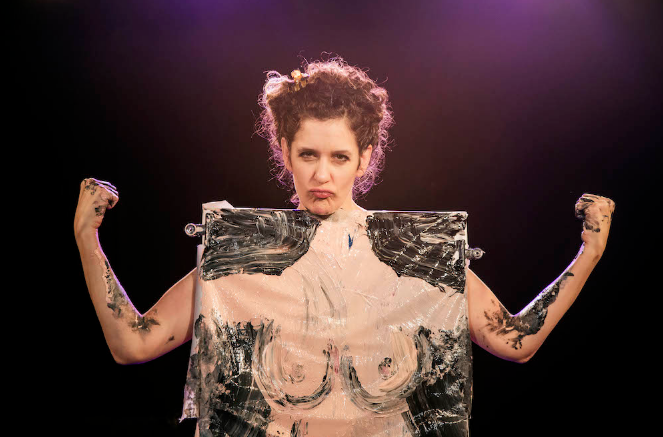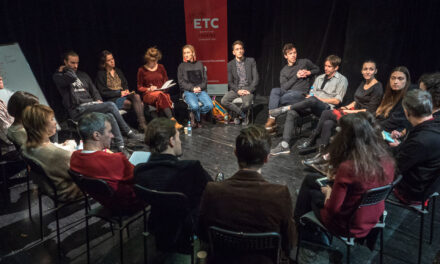If theater around the world previously sought to destroy the fourth wall, it has recently had to deal with this wall doubling. It is increasingly difficult for the audience and the performance to meet during the COVID-19 pandemic. Theaters in many countries are closed or operating in a limited way. For many theater organisations, online projects have become the only way to survive because theatre is impossible without an audience. It is not easy to convey the live energy of theater, the atmosphere of the auditorium and the tension on stage through digital technology. While some say that nothing compares to the living breath of the theater hall, others are trying to adapt to new conditions. This is achieved with varying degrees of success.
Without a doubt, Isra-Drama & International Exposure of Israel Theatre has become the bright light of online festivals over the past year. Its program included seventeen original productions, as well as six panel discussions about the pressing problems of theatre in Israeli and around the world. This year’s festival preceded the Jewish holiday of Hanukkah. Hanukkah celebrates the victory of light over darkness, purity and sincerity over conformity and adaptability, and spirituality over pure materialism. In this regard, the performances of the festival, unwittingly, corresponded to the message of the holiday – they brought light in all senses of the word.
On Hanukkah, it is customary to light a special nine-branched candelabrum during the eight-day holiday. On each night of Hanukkah, a new branch is lit. The ninth holder, called the shamash (“helper” or “servant”), is for a candle used to light all other candles or to be used as an extra light. In honor of the holiday, here are eight highlight performances of the festival’s program – eight candles from my personal theater candelabra that made a great impression in an online format, and which I will be happy to review off-line when I am in Israel again. Online recordings of all performances are on the festival’s website, so everyone has the opportunity to recharge with the festival’s theatrical energy from almost anywhere in the world.
Theatre shamash: Isra-Drama & International Exposure of Israeli Theatre
The festival’s creators, including the Ministry of Culture and Sports of Israel and the Hanoch Levin Institute of Israeli Drama, aim to introduce the world to shining examples of Israeli theater. The annual showcase demonstrates innovative solutions that impress theatre audiences everywhere. This year’s festival program was divided into several main thematic blocks: literature, classical theatre, physical theatre, social and political issues, and solo shows. All performances are subtitled in English.
The first candle: A TALE OF LOVE AND DARKNESS, written and directed by Aya Kaplan (based on segments from the book by Amos Oz), by The Jerusalem Khan Theatre
The play is based on an autobiography of the famous Israeli writer Amos Oz. The book has been translated into more than thirty languages and adapted into a film by Natalie Portman. The play shows the relationship of Fani, the writer’s mother, with her husband and son, and traces the life of the writer’s family and the state of Israel over many decades. The history of the family is intertwined with the history of the people. It is performed in the traditional manner of psychological theatre and is filled with piercing acting. The chamber space on the stage reveals the nooks and crannies of the characters’ souls, their pain, drama and personal experiences. Full of everyday details and as close as possible to historical accuracy, the performance makes the viewer feel like a guest of the Klauzner family who shares their joys, fears and hardships with them.
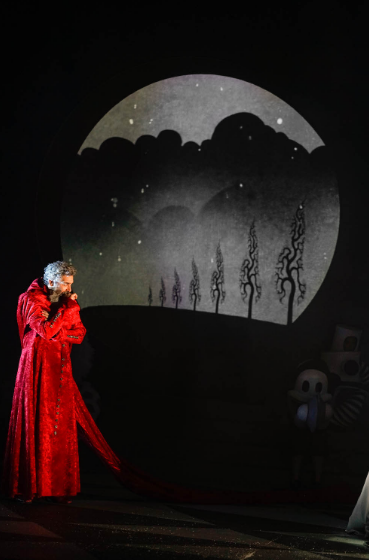
The Constant Mourner. The Cameri Theatre. Photo from Isra-Drama official website.
The second candle: THE CONSTANT MOURNER by Hanoch Levin, directed by Ari Folman, by THE CAMERI THEATRE
This performance can be called a fairy tale for adults, but with more truth than magic. However, the main magic is the wonder created by a performance full of illusions, surprises and reincarnations. Music and video design tells the story of a king whose son died of a serious illness. The king relives this tragedy again and again, accompanied by many mysterious rituals and sacred actions. The viewer is muted in the illusory world, inspired by images of early German cinema, and full of non-theatrical, unfeigned pain. Hanoch Levin called the play a “whining comedy,” but it has long been known that genuine comedy must have a core of drama. It is a performance that creates a special world where the sometimes-incongruous is combined with an amazing journey deep into our most painful and bitter emotions. This theatrical production can be therapeutic for many and the theatrical language of Ari Folman, whose animated film Waltz with Bashir (2008) won world-leading awards such as a Golden Globe,, is truly noteworthy.
The third candle: WE BLUSH, created and performed by Gony Paz
Theatre is sometimes compared to exposing the soul. The creators of this production explore the topic of embarrassment and shame, trying to comprehend it in theatrical language. Using dolls, videography, shadow theatre, online shooting, as well as familiar household items in unusual qualities, the creators tell of the birth of human emotions and their manifestations, as well as the birth of theater, which takes place right in front of the audience. This is an amazing experience of living and experiencing feelings that we are not always ready to talk about, but which are an integral part of us.
The fourth candle: MIKVEH by Hadar Galron and directed by Rafi Niv, by Habima National Theatre
A mikveh is a Jewish ritual bath. This space in the play becomes a place of revelation, confessions and sorrows for women. Eight dramatic stories are filled with secrets, innuendos and lies, as well as the hardships of women living in a male-dominated religious world. Traditions and rituals, fears and disappointments – each of the heroines has their own deep space of throbbing pain inside. In the play, Hadar Galron explores the role of women and feminism in the conditions of closed religious communities. It not only has much social significance, but also represents an interesting dramatic construction where there are no episodic roles and the voice of each heroine sounds clean, clear and piercing.
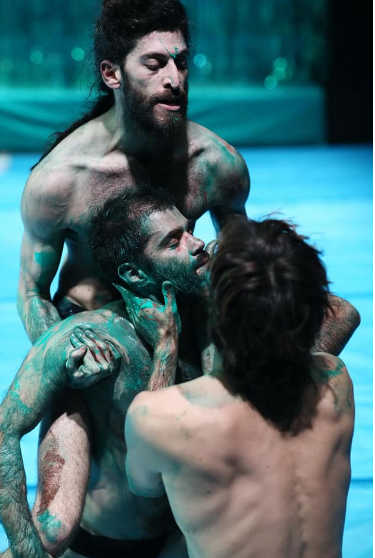
Raining Men – Carnival on the Battlefield. Or Marin and Oran Nahum Dance Theatre Group. Photo from Isra-Drama official website.
The fifth candle: RAINING MEN – CARNIVAL ON THE BATTLEFIELD, by OR MARIN and ORAN NAHUM DANCE THEATRE GROUP
This is a frank and provocative performance that explores gender boundaries and society’s stereotypes and prejudices. Three men, overcoming the space of their own physicality, create bright and sometimes flashy visual images designed to test the audience’s limits of hypocrisy and excitability. The lively and vibrant palette of emotions generated in dramatic dance and physical sketches is limited only by the space of the audience’s imagination. This is an impressive, vivid and ruthless performance in which gestures and physical actions become more eloquent than words, an energetic and powerful theatrical experience.
The sixth candle: SOMEONE LIKE ME by Roy Chen, directed by Ealeal Semel, by Gesher Theatre
Roy Chen wrote this after six months of studying the conditions at Abarnabel Psychiatric Hospital in Israel. The plot tells the story of five teenage patients who put on their own performance. A work with a «double bottom» (play within a play) allows viewers to see familiar things from a different angle. Familiar doesn’t mean normal. Also, what are the limits of the norm? What creates demons within us, and when and where are we ever entirely true? This play reveals the deepest parts of people’s souls and highlights what is usually hidden from us. It is amazing how in a performance that resembles an intimate experience of psychotherapy, there is a place for humor, and spectacular effects that are born at arm’s length are enjoyed at an extremely close distance. The healing power of the theatre has never been so clearly and convincingly demonstrated.
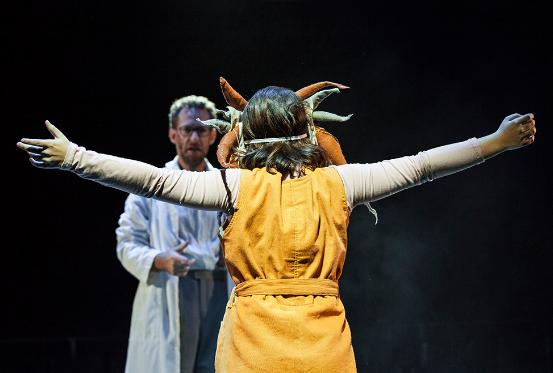
SOMEONE LIKE ME. Gesher Theatre. Photo By: Isaiah Fainberg (Isra-Drama official website)
The seventh candle: CARTE BLANCHE, created and performed by Michal Svironi
What do you need for a theatrical miracle? Creator, clown, puppeteer, comedienne, and performer Michal Svironi convincingly proves that there is enough paper and paint, with talent and fearlessness, of course. In her bright and colorful – in every sense of the word – solo performance, the theatre is born here and now right in front of the audience. It disappears in an instant, demonstrating that theatre is the most non-egoistic art that is born and dies over the course of a single evening. The performer fills blank sheet, or Сarte blanche, of the performance with grotesque episodes drawn with theatrical paints and artist’s colors. This is an impressive experience of theatre based entirely on improvisation and interdisciplinary approaches. A symphony of arts, harmony of music, words, images and artistic techniques, facial expressions and gestures, this performance truly expands the boundaries of the familiar. They say that actors are paint in the hands of the director; Сarte blanche is the experience when paint becomes a director. This is an unpredictable canvas that fails to leave one feeling indifferent.
The eighth candle: THE NEO-ANDERTHALS, written and directed by Noam Rubinstein
If the world ends one day, a new era will come – the era of the NEO-ANDERTHALS. This performance consists of witty and talented physical theater sketches telling us what preceded the general collapse and decline of society. In fact, this is a social pamphlet that does not contain malicious satire, but has talented observations and thoughts about modern technological progress, pop culture and consumer society. It’s a very funny production in which laughter is replaced by thoughts that we are laughing not so much at the actors of this theatrical sitcom, but at ourselves, recognizing ourselves as in a mirror. Clowning, parody, and mimicry make an inspiring theatrical cocktail. Perhaps this is the most optimistic performance of the festival, inspiring positivity and belief that collapse is not the end, but a new beginning. In an era when our plans are being disrupted by Coronavirus, these emotions are entirely hard to overstate.
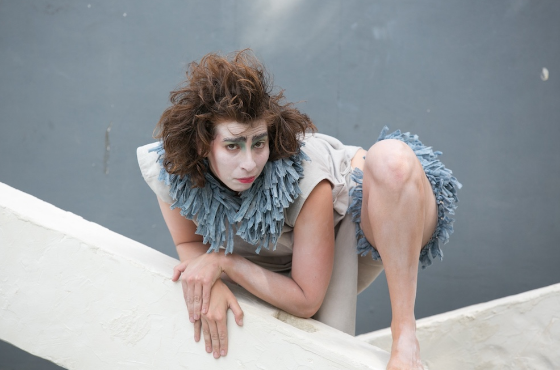
THE NEO-ANDERTHALS. Written and Directed by Noam Rubinstein. Photo from Isra-Drama official website.
This post was written by the author in their personal capacity.The opinions expressed in this article are the author’s own and do not reflect the view of The Theatre Times, their staff or collaborators.
This post was written by Emiliia Dementsova.
The views expressed here belong to the author and do not necessarily reflect our views and opinions.

